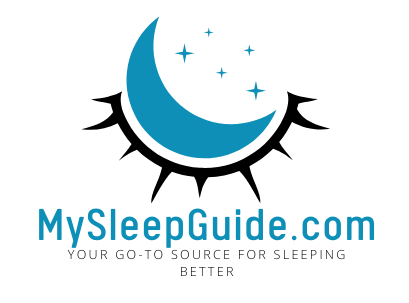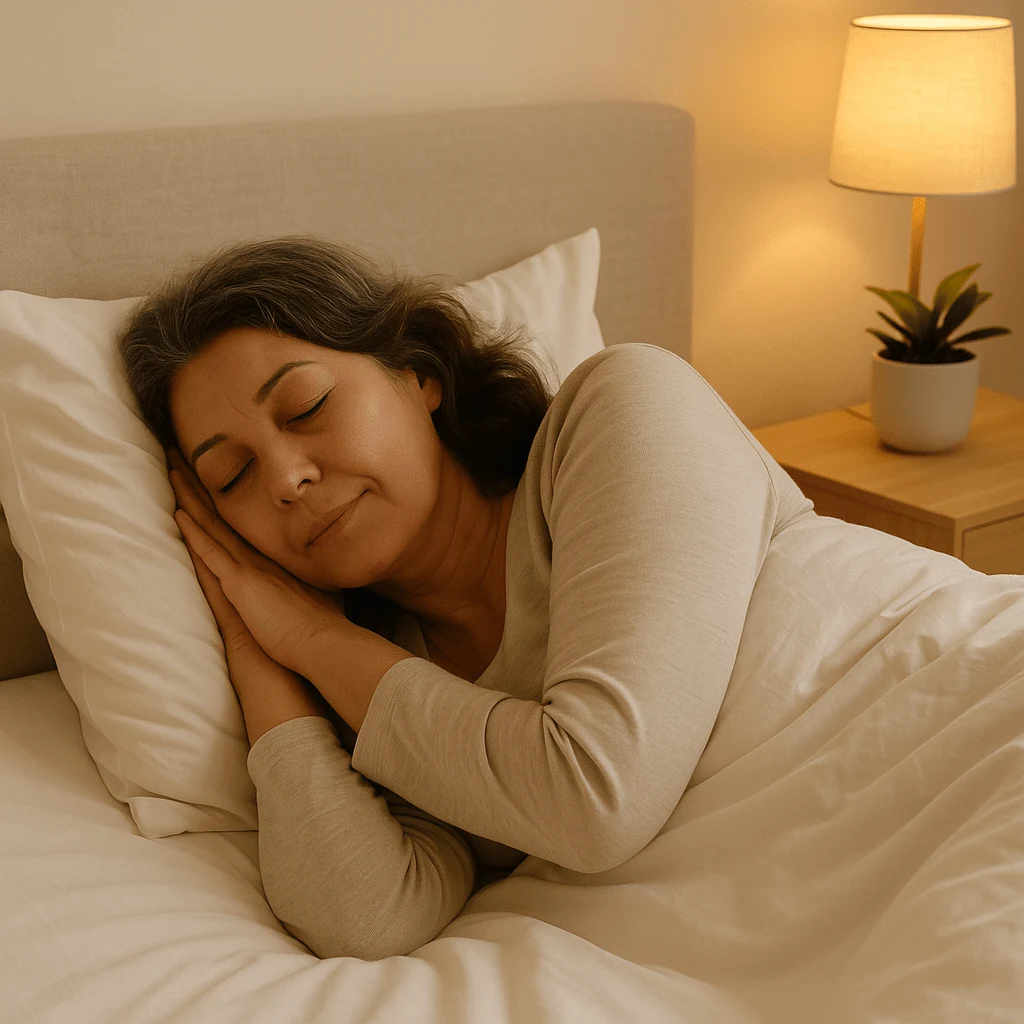Sleeping during menopause can feel like an uphill battle. Between hot flashes that jolt you awake, night sweats that leave your sheets damp, and a mind that won’t switch off, restful sleep often feels out of reach. Many women in midlife find themselves lying awake at 2 a.m., wondering if they’ll ever get through a full night without interruptions.
The truth is, you’re not alone — and you don’t have to settle for exhaustion as your “new normal.” With the right strategies, sleeping during menopause can become easier, calmer, and more consistent. In this guide, we’ll explore why menopause disrupts sleep in the first place and share ten science-backed tricks to help you reclaim your nights.
Think of this as a supportive roadmap: clear steps you can try right away, grounded in both research and real-life experience. By the end, you’ll have practical tools to cool your body, calm your mind, and finally drift into the deep, restorative rest you deserve.
Why Women Have Trouble Sleeping During Menopause
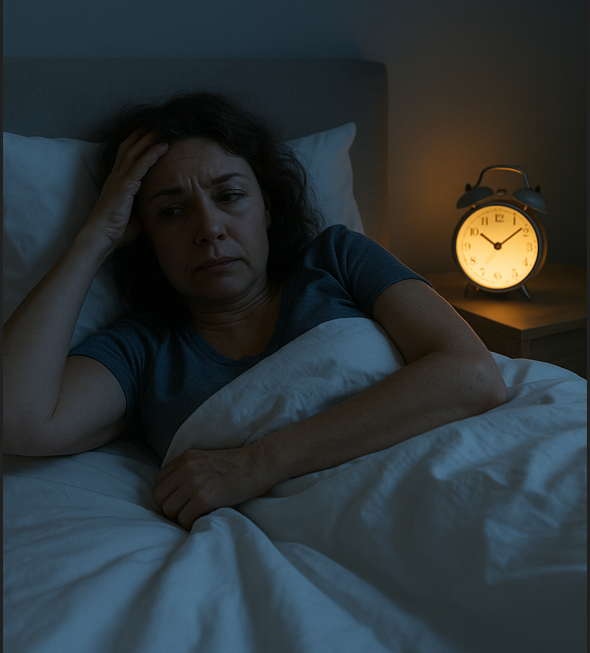
Struggling to fall asleep or stay asleep at night is a very real part of menopause for many women. In fact, up to 60% report trouble sleeping during menopause, and it usually comes down to a mix of hormonal shifts and physical changes that make it harder for your body to stay in balance at night.
Hormonal changes
As estrogen and progesterone levels drop, your body’s natural sleep rhythm takes a hit. Progesterone is sometimes called the “relaxation hormone,” and when there’s less of it, it’s harder to drift off peacefully. Estrogen also plays a role in regulating temperature and serotonin (the “feel-good” brain chemical that supports sleep). When both decline, insomnia often creeps in.
Night sweats and hot flashes
Those sudden waves of heat aren’t just uncomfortable — they literally jolt your body out of sleep. Night sweats can leave your bedding damp, making it tough to fall back asleep. This cycle of waking, cooling down, and trying again can repeat several times a night.
Stress and mood changes
Hormonal fluctuations don’t just affect the body — they also impact the brain. Anxiety, irritability, or mood swings can keep your mind racing long after you’ve turned out the light. And when your brain is in “alert mode,” sleep doesn’t come easily.
Age-related sleep shifts
On top of menopause, women in midlife naturally start experiencing lighter sleep. Deep, restorative stages of sleep become shorter, making you more prone to waking during the night. Combine this with hormonal symptoms, and it’s no wonder sleep feels so elusive.
10 Science-Backed Tricks for Sleeping Better During Menopause
While menopause changes your body in ways you can’t control, there are plenty of practical steps you can take to improve your nights. These simple, science-backed strategies help reduce night sweats, calm your mind, and give your body the conditions it needs for deeper sleep.
1. Cool Your Bedroom to Calm Night Sweats
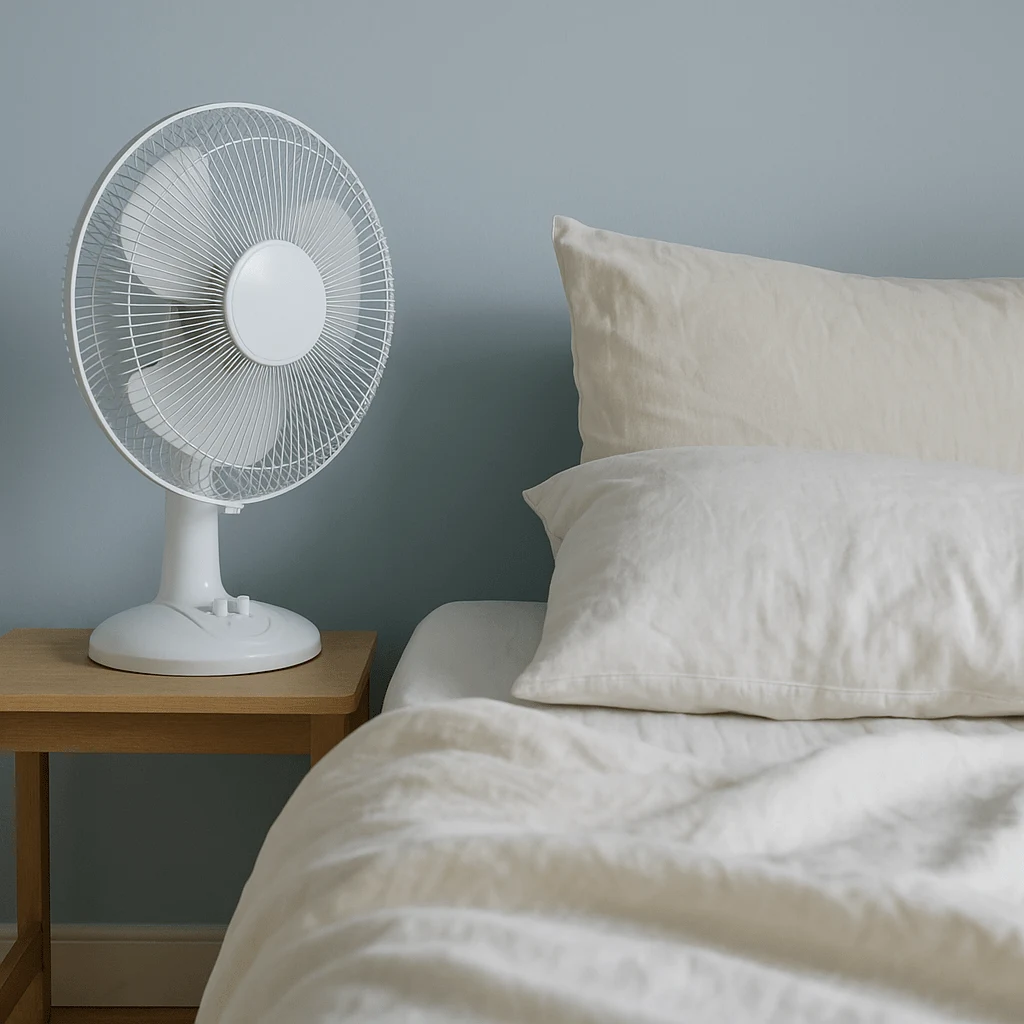
Hot flashes and night sweats are some of the biggest culprits behind poor rest. One of the simplest ways to make sleeping during menopause easier is to keep your bedroom cool.
- Use breathable bedding like cotton or bamboo.
- Run a small bedside fan for steady airflow.
- Choose moisture-wicking pajamas to avoid overheating.
✅ Quick tip: lower your thermostat by just a few degrees tonight and see if it helps you fall back asleep more quickly.
2. Signal Your Body to Sleep with a Relaxing Routine
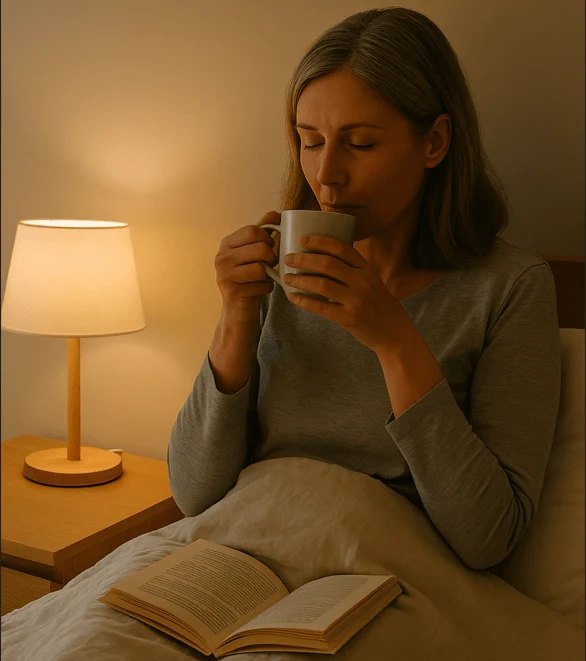
Your body responds well to routine — a set of calming habits can tell your brain it’s time to wind down.
- Drink a caffeine-free herbal tea in the evening.
- Read a few pages of a book or listen to quiet music.
- Try light stretching or a short breathing exercise.
✅ Choose one or two simple habits and repeat them nightly — the consistency is what helps you drift off more easily.
Related Posts:
3. Nourish Your Body with Hormone-Friendly Nutrition

What you eat during the day affects how you sleep at night. Certain foods help balance hormones and support better sleep during menopause.
- Add phytoestrogen-rich foods like flaxseed, soy, and chickpeas.
- Eat magnesium sources such as leafy greens, nuts, and seeds.
- Avoid spicy foods or heavy meals close to bedtime.
✅ Try including one hormone-friendly food in your meals this week and track whether your sleep feels more settled.
4. Try Natural Sleep Supplements Wisely
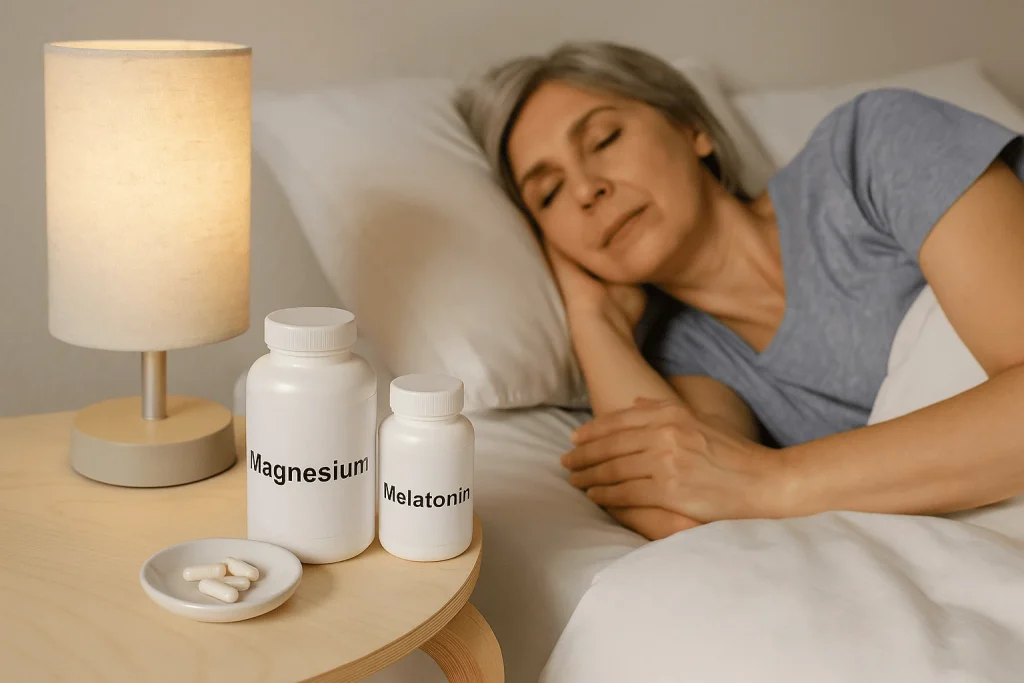
Some supplements can support deeper rest and reduce sleeping issues during menopause. Common options include:
- Melatonin to help reset your body clock.
- Magnesium glycinate for relaxation.
- Valerian root for easing occasional insomnia.
✅ If you’re considering supplements, start with one and track how your body responds — and always check with your doctor before adding anything new.
5. Limit Caffeine, Alcohol, and Heavy Meals at Night
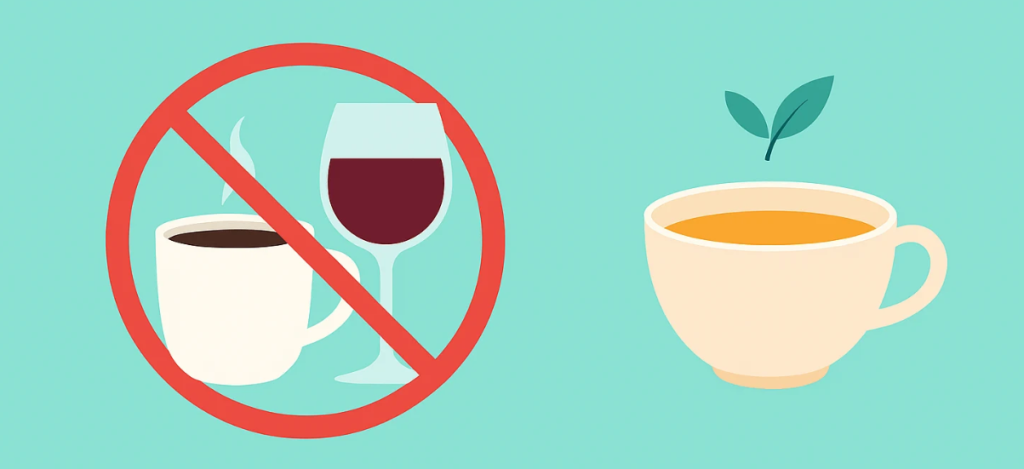
Certain habits can make trouble sleeping during menopause worse. Stimulants and rich foods disrupt your sleep cycle:
- Avoid caffeine after mid-afternoon.
- Skip late-night alcohol, which can fragment sleep.
- Steer clear of heavy or spicy dinners before bed.
✅ Test this by swapping your evening coffee or wine for a calming tea — small changes here often bring big improvements in sleep quality.
Related: 10 Easy Recipes That Help You Sleep Better
6. Stay Active During the Day

Exercise helps regulate hormones, reduce stress, and improve sleep quality. Women who stay active are less likely to struggle with problems sleeping during menopause.
- Aim for 20–30 minutes of daily activity.
- Walking, swimming, or yoga are all good options.
- Avoid intense workouts too close to bedtime.
✅ Start small — even a short daily walk can improve your chances of a better night’s rest.
7. Manage Stress to Calm Your Nervous System
Stress and anxiety can make it harder to fall and stay asleep. Learning to relax before bed can ease a hard time sleeping during menopause.
- Practice slow, deep breathing.
- Try gentle yoga or meditation.
- Keep a journal to release racing thoughts.
✅ Pick one calming activity to add before bed this week — notice if it helps you unwind faster.
8. Practice Smart Sleep Hygiene
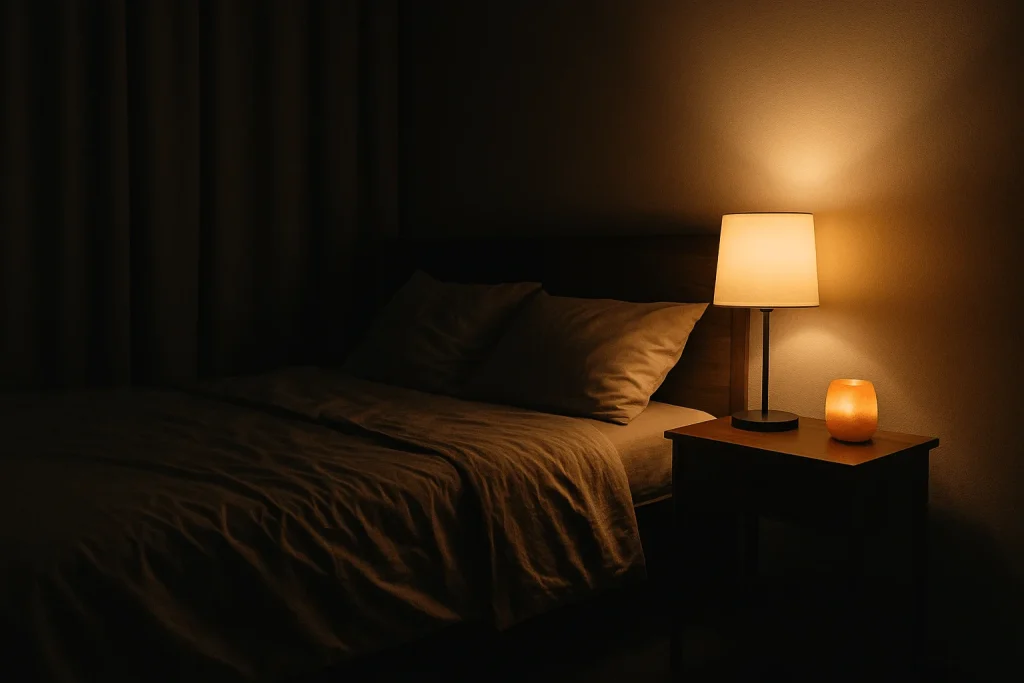
Good sleep hygiene means setting up healthy habits that support rest. This is especially important if you’re dealing with sleeping issues during menopause.
- Go to bed and wake up at the same time daily.
- Keep your bedroom dark, quiet, and cool.
- Avoid screens at least an hour before bed.
✅ Choose one sleep hygiene habit you can start tonight and build from there.
9. Get Professional Support When Needed
If sleepless nights persist, it may be time to seek help. Doctors can evaluate whether underlying issues or treatments like CBT-I, hormone therapy, or short-term medications may help. Some women also ask about sleeping tablets during menopause, but these should only be used under medical guidance.
✅ If your sleep problems last more than a few months, talk to your healthcare provider about safe options for relief.
Related Post: The Most Overlooked Sleep Disorders ( and How To Spot Them Early)
10. Track Your Sleep Patterns
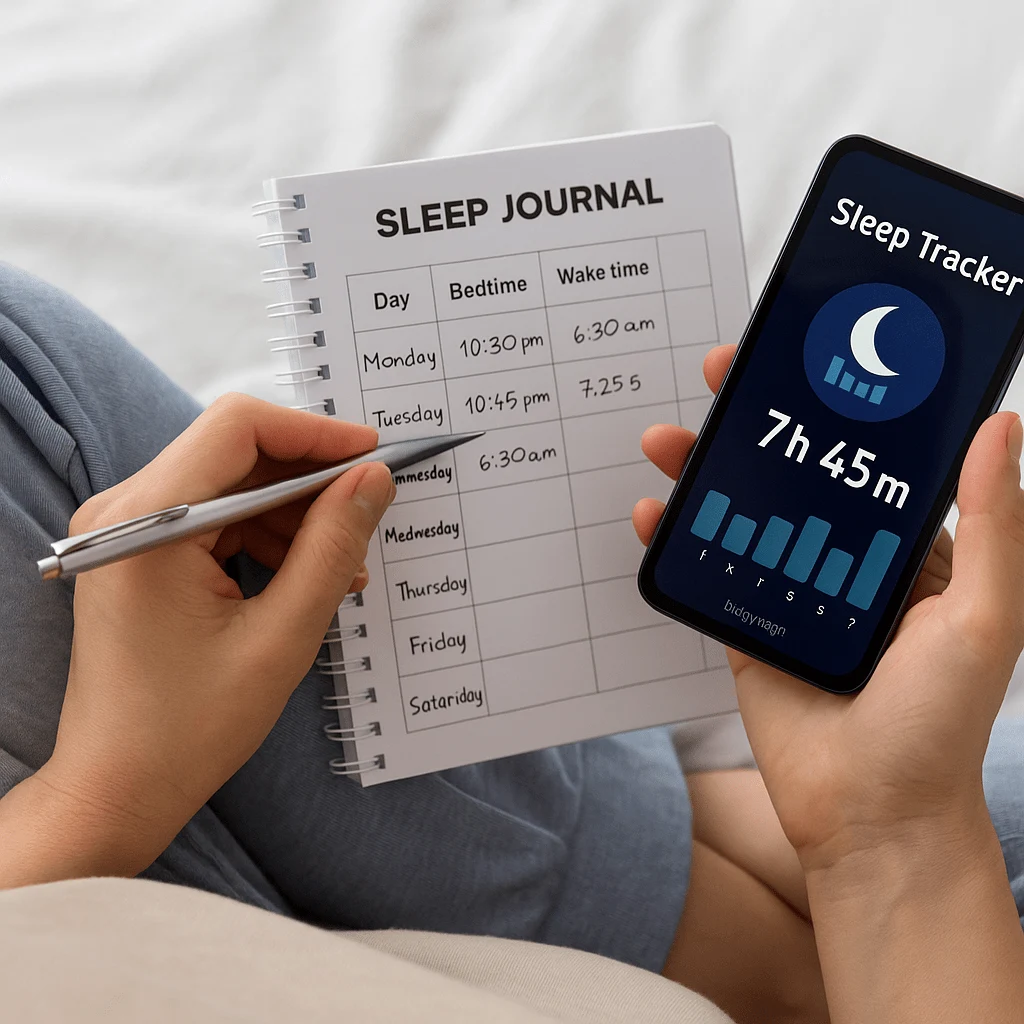
Keeping track of your sleep helps you spot patterns and identify triggers.
- Use a simple sleep journal.
- Note what helps or worsens your sleep.
- Apps and wearables can also provide insights.
✅ Try logging your sleep for one week — you may discover small habits that make a big difference.
When Sleeping During Menopause Becomes a Bigger Issue

For most women, making small changes to daily habits can ease menopause-related sleep struggles. But sometimes, sleeping problems during menopause involve more than just hot flashes and restless nights. In these cases, it’s important not to brush it off as “just menopause.”
Signs It May Be More Than Menopause
- You regularly get less than 4–5 hours of sleep a night.
- Fatigue is so strong it interferes with daily life.
- You wake up gasping, snoring heavily, or with morning headaches.
- Sleep problems continue for months despite trying lifestyle changes.
Possible Underlying Causes
Some women develop sleep disorders during midlife that overlap with menopause symptoms:
- Sleep apnea (breathing interruptions at night).
- Restless legs syndrome (uncomfortable sensations in the legs).
- Thyroid imbalances or depression, both of which can affect sleep.
When to Seek Professional Help
If poor sleep lasts more than a few months or is seriously impacting your health, it’s time to speak with your doctor. Medical professionals can help identify whether additional treatments — such as cognitive behavioral therapy for insomnia (CBT-I), hormone therapy, or other targeted care — may be right for you.
Conclusion: Simple Tricks for Better Sleeping During Menopause
Sleeping during menopause doesn’t have to mean endless restless nights. While hot flashes, night sweats, and hormonal changes can make rest feel out of reach, the truth is that small, consistent steps can make a big difference.
From cooling your bedroom and creating a calming routine to focusing on nutrition, exercise, and stress relief, these strategies give your body and mind the support they need.
If you’ve been struggling, start small — try one or two changes tonight and see how you feel. Over time, these habits build on each other, helping you create a routine that works for you.
🌙 FAQs About Sleeping During Menopause
1. Why do women have trouble sleeping during menopause?
Falling estrogen and progesterone levels affect your body’s ability to regulate temperature and promote restful sleep. This often leads to hot flashes, night sweats, and restless nights. Stress and natural age-related changes to sleep cycles can make the problem worse.
2. How to deal with sleeplessness during menopause?
Start with simple lifestyle changes: keep your bedroom cool, follow a consistent bedtime routine, limit caffeine and alcohol, and use calming techniques like deep breathing or meditation. Regular exercise and natural supplements such as magnesium may also support better sleep.
3. Does insomnia get better after menopause?
For many women, menopause-related insomnia improves once hormone levels stabilize. However, some continue to struggle due to age-related sleep changes or other conditions. Practicing good sleep habits and seeking professional support when needed can help reduce long-term sleep problems.
4. How long does menopause insomnia last?
Menopause insomnia can last a few months or, for some women, several years. It depends on how long hormone fluctuations continue and whether other sleep issues are present. Most women notice improvements once the transition is complete.
5. What medication is used to help sleep during menopause?
Doctors may recommend short-term sleep aids, low-dose antidepressants, or hormone replacement therapy (HRT) for severe cases. However, lifestyle adjustments and natural remedies are usually the first step. Always talk to a healthcare provider before starting any medication.
6. Does estrogen help you sleep better?
Yes. Estrogen can ease some sleep problems by reducing hot flashes, night sweats, and mood swings. Hormone replacement therapy (HRT) may help restore sleep quality, but it isn’t suitable for everyone and should be considered carefully with your doctor.
